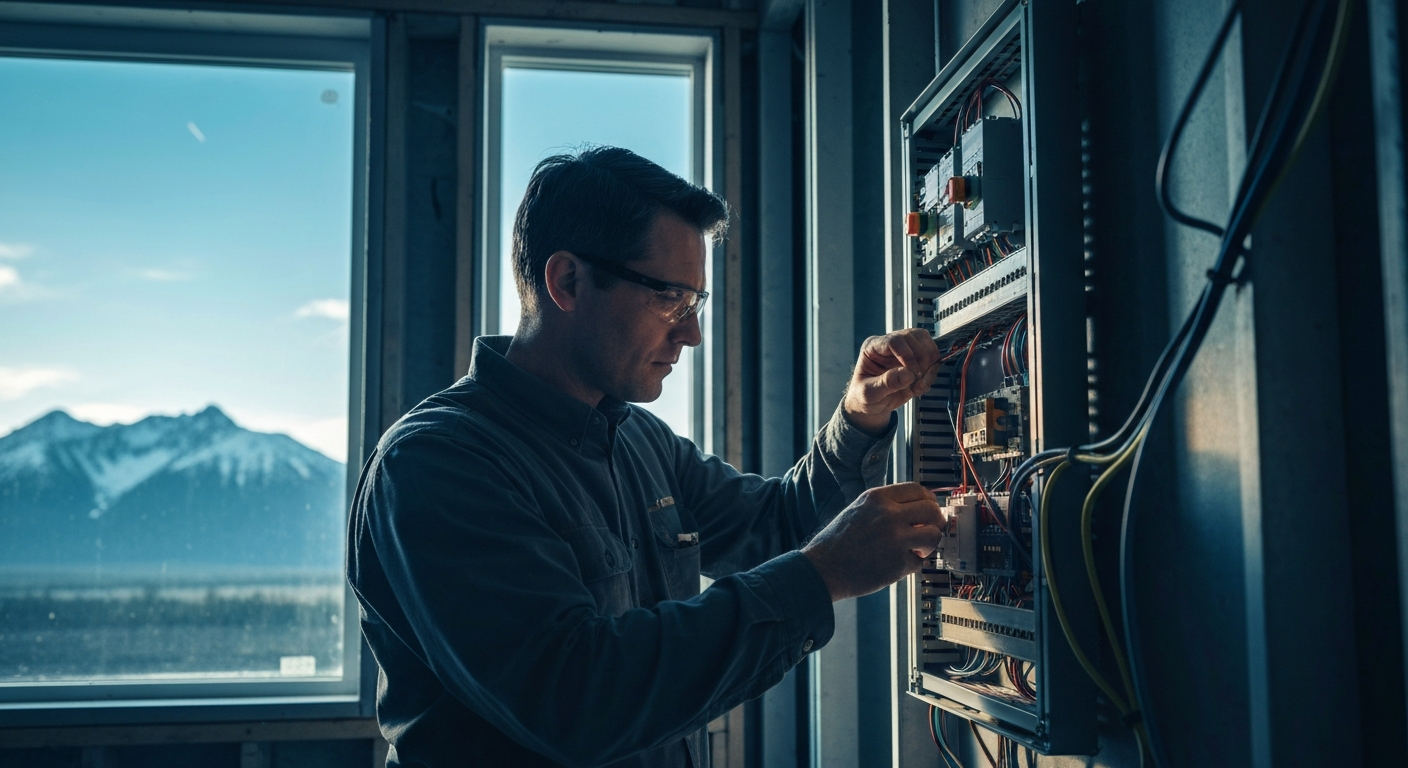
Alaska Electrician License: A 2024 Guide to Certification
Unlike many states with a single licensing board, Alaska divides its credentials between two primary state bodies. This guide will clarify the process, breaking down the specific pathways to obtaining your Alaska electrician license and helping you understand the roles of the key state agencies. Whether you’re starting an apprenticeship or looking to become a contractor, here’s what you need to know about getting licensed. For a general overview of the trade, you can also explore how to become a licensed electrician nationwide.
Two Agencies, Two Credentials: Understanding Alaska’s Licensing Framework
The most important thing to understand about electrical licensing in Alaska is that the credential for performing hands-on work is separate from the license required to supervise and run a business. This responsibility is split between two different state departments.
- The Department of Labor and Workforce Development (L&WD): This department’s Mechanical Inspection Section issues the Certificate of Fitness for electricians. This is the core credential that allows you to legally perform electrical work as a journeyman or residential electrician.
- The Division of Corporations, Business and Professional Licensing (DCCED): This division, under the Department of Commerce, issues the Alaska electrical administrator license. This is a supervisory license and is the state’s master electrician equivalent, required for anyone who owns or operates an electrical contracting business.
Understanding this division is the key to navigating your career path, from apprentice to business owner.
The Pathway to Hands-On Work: Earning Your Certificate of Fitness
For electricians performing installations and maintenance, the Certificate of Fitness is the essential credential. The journey begins with an apprenticeship to log the necessary journeyman work experience hours. The state offers two primary paths for this certificate.
Journeyman Electrician Requirements Alaska
The Journeyman Electrician Certificate of Fitness allows you to work on any type of project, including residential, commercial, and industrial settings involving unlimited commercial wiring. It is the most comprehensive hands-on certification available.
- Work Experience: Applicants need to provide electrical work experience verification for a total of 8,000 hours. Of these, a minimum of 6,000 hours must be in commercial or industrial work, with a maximum of 2,000 hours coming from residential projects.
- Training Substitution: Up to 1,000 hours of approved classroom instruction can be used to meet the 8,000-hour requirement.
- Examination: After your experience is verified and your application is approved by the L&WD, you must pass a state-administered journeyman exam.
- Continuing Education: To renew your certificate every two years, you must complete 16 hours of Alaska electrician continuing education. At least eight of these hours must be dedicated to changes and updates in the National Electrical Code (NEC).
Residential Wireman Certificate of Fitness
For electricians who plan to specialize exclusively in homes, the Residential Wireman Certificate of Fitness offers a more direct path.
- Work Experience: This certificate requires 4,000 hours of documented work experience specifically in residential wiring.
- Training Substitution: You can substitute up to 500 hours of relevant classroom training toward the total experience requirement.
- Scope of Work: This certificate limits your work to one- to four-family dwellings. You are considered a trainee if working on a commercial site.
- Examination: A passing score on the residential electrician exam is required.
- Continuing Education: To renew the certificate every two years, you must complete 16 hours of continuing education, with at least eight hours focused on the National Electrical Code (NEC).
Both pathways typically begin with formal apprenticeship requirements, which ensure you receive the structured training and on-the-job experience needed to qualify for the exam.
Level Up Your Career: The Alaska Electrical Administrator License
If your goal is to own a business or lead a team, you’ll need to obtain an Alaska Electrical Administrator license from the DCCED. While this license is for supervising and is required for a contracting business, hands-on work still requires a separate Certificate of Fitness. It’s a credential that authorizes you to take on supervising electrician responsibilities for a licensed contracting business.
The Electrical Administrator license has several distinct categories, including:
- Unlimited Commercial Wiring (UCW)
- Residential Wiring (RW)
- Controls and Control Wiring
- Inside or Outside Communications
- Unlimited Outside Linework
Requirements vary by category. For example, to earn the Residential Wiring (RW) administrator license, you generally need to show proof of at least two years of experience as a journeyman residential wireman within the four years immediately before applying. All categories require passing a specific administrator exam. This advanced license is essential if you’re thinking about starting an electrical business in Alaska.
Successfully securing this license is a major step in career advancement and a prerequisite if you want to start an electrical contractor business in Alaska.
Staying Current: AK Electrical Code and Reciprocity
Compliance and staying up-to-date are fundamental to the electrical trade. The minimum standard for all electrical work in the state is based on the 2020 National Electrical Code (NEC), which serves as the foundation for the AK electrical code with state-specific amendments. All licensing exams and continuing education are based on this code edition.
For electricians moving to the state, Alaska offers electrical license reciprocity for the Journeyman Certificate of Fitness with several states, including Colorado, Minnesota, Montana, Nebraska, New Mexico, North Dakota, South Dakota, and Wyoming, among others. You must hold a current license obtained by examination in one of these states to qualify.
Your Future in the Alaskan Electrical Industry
The combination of high demand, excellent pay, and significant state investment creates a strong foundation for a lasting career. The Alaska electrician job market is robust, with opportunities spanning from residential services in growing communities to large-scale industrial and infrastructure projects. By understanding the state’s unique licensing structure and committing to professional development, you can build a successful and rewarding career in the 49th state.
Whether you are renewing your journeyman certificate or maintaining your administrator license, staying current with your continuing education is essential. ExpertCE offers state-approved courses to meet your renewal requirements and keep you at the top of your field. Ready to meet your CE requirements? Browse our courses today to find the Alaska-approved classes you need.
Alaska Continuing Education Courses
Explore our board-approved continuing education courses for Alaska professionals:
View CE RequirementsAlaska 2023 NEC (Ch 1-4), 8 hours Electrical Administrators License Renewal Package
Alaska 2023 NEC (Ch 4-7), 8 hours Electrical Administrators License Renewal Package
Alaska 2023 NEC 16 Hr Electrical License Renewal Package
Disclaimer: The information provided in this educational content has been prepared with care to reflect current regulatory requirements for continuing education. However, licensing rules and regulations can vary by state and are subject to change. While we strive for accuracy, ExpertCE cannot guarantee that all details are complete or up to date at the time of reading. For the most current and authoritative information, always refer directly to your state’s official licensing board or regulatory agency.






